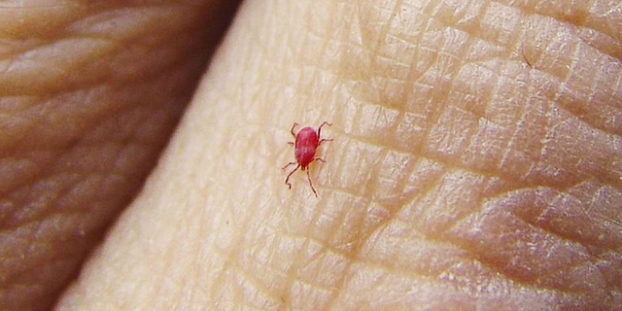Extension Service: How to deal with chiggers
By Cole Sikes
AUBURN UNIVERSITY, Ala. – One of the peskiest outdoor insects may be crawling around your neck of the woods. Chiggers are nearly invisible and hard to control because of their size. However, with the appropriate control, you can keep your family off their menu.
What is a chigger?
Chiggers, also referred to as redbugs, are a group of mites that live in densely vegetative areas. The most prominent species of chigger in Alabama is the hard-biting Trombicular alfreddugesi.
In their larval stage, these mites are parasitic and red in color. As they age, their feeding habits change and they will fade to yellow in color. The unfortunate news is that to grow, they must feed on your skin cells.
Identification
“Chigger mites are barely visible to the naked eye,” says Xing Ping Hu, Alabama Cooperative Extension System Entomologist. “They are possible to be seen on light-colored backgrounds where they contrast, especially in groups.”
In their larval stage they measure less than 0.4 millimeters and have three pairs of legs. At the nymphal and adult stages, they have four pairs of legs, with the adult bigger in size by about one millimeter in diameter.
Habitats, Life Stages and Food Sources
Summertime is peak chigger season. Hu says redbugs prefer undergrowth vegetation combined with high humidity levels. The presence of shade in an area will also create a favorable habitat for these mites.
“Unlike many mites that have the same diet in all life stages, chiggers vary in behavior and diet at different maturity levels,” said Hu. “In their larval stage, the six-legged larvae are parasitic. They dine on vertebrate animals such as humans, reptiles, birds, rodents and other wild and domestic mammals.”
After developing into eight-legged nymphs and adults, they become free-living predators. In their final form they eat small arthropods and insect eggs or plant material in the soil but not vertebrate animals.
Parasitic Pests
Contrary to popular belief, chiggers do not burrow into your skin when biting. After finding a host, redbug larvae locate a thin section of tender skin and feed. They are not capable of transmitting disease or burrowing under the skin like scabies mites.
Chiggers also do not drink blood like mosquitoes and bed bugs. However, they do have a short piercing mouth. When inflicting a bite, a redbug will inject saliva containing a special enzyme. This digestive protein will liquify skin cells for the mite to use as food.
The injected saliva will induce reddish welts on the skin and cause intense itching. These symptoms can last for several days to two weeks in severe cases.
“A redbug often goes unnoticed for one to three hours after it starts feeding,” Hu said. “The itching sensation typically occurs after the larvae has detached from the skin.”
Control
The best solution for chigger mite populations is to clear any potential or active breeding sites. An ideal time for this control method is in the spring before their numbers grow.
Removing shrubs and bushes, keeping grass short, and pruning trees to increase sunlight will mitigate habitat for chiggers. These cultural practices create habitats less suitable for chiggers and their animal hosts.
There are insecticide options for chigger control as well. However, insecticide spray alone cannot be a long-term solution because of their limited efficacy and residue period. If you must apply insecticide, direct the spray toward borders and fences between woody areas and the lawn, around ornamental plantings, beside foot paths and in areas where chiggers and their animal hosts are known to be abundant.
A single application on property in May is often all that is required. In severe infestations, retreatment is needed after two to three weeks. Do not treat areas where livestock feed or graze. Keep children and pets off treated areas until dry. As with any chemical, follow label instructions when applying these products.
More Information
Chiggers are one of the most common insect pests that affect you while enjoying the outdoors during the warm seasons. Shed the light literally and figuratively by controlling their population on your property and educating others about their habits.
For more information on chigger mites as well as a host of other insects, please visit the Alabama Extension website at www.aces.edu.







